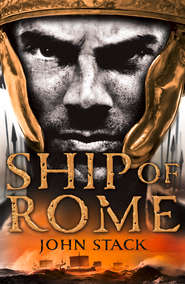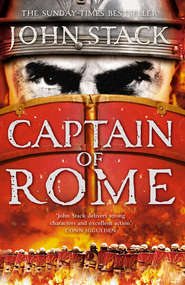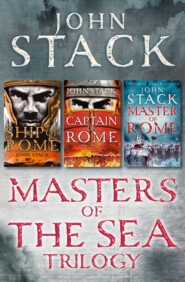По всем вопросам обращайтесь на: info@litportal.ru
(©) 2003-2024.
✖
Armada
Автор
Год написания книги
2018
Настройки чтения
Размер шрифта
Высота строк
Поля
‘They are already with God,’ Father Blackthorne said reassuringly, although he shuddered involuntarily as he thought of their fate.
The Babington plot, so named after the most prominent of the conspirators, had been exposed six months before. Father Blackthorne had only heard rumours of it before its discovery, but he had long suspected that the Duke of Clarsdale had possessed some greater knowledge, even if he had not been directly involved. The conspirators had been sentenced to be hanged, drawn and quartered and such was the brutality and suffering of those first executed, the Queen herself had blanched and ordered the others to be hanged until dead before they were disembowelled.
‘They may be with God, Father, for their sacrifice,’ Clarsdale cursed, ‘but they should be suffering hellfire for their stupidity.’
Father Blackthorne recoiled with shock at the vehemence of the duke’s words and crossed himself.
‘I have learned that Walsingham knew of their plot months before and was playing them like fools in order to expose Mary Stuart,’ Clarsdale continued, turning to the priest for the first time, his face a mask of belligerence. ‘So now we have lost our last hope of placing a legitimate Catholic monarch on the throne of England.’
Father Blackthorne nodded. ‘Her death is a tragedy,’ he said in lament, ‘may her soul rest in God’s peace. Many of my flock have already lost hope and have cast their mortal souls aside by turning their backs on the true faith.’
‘Your flock,’ Clarsdale scoffed as he moved to sit down and the wolfhounds became alert once more as their master swept by. ‘They are sheep indeed, Father, mere peasants who will follow whoever holds power over the realm.’
‘But we need those people,’ Father Blackthorne argued. ‘We must maintain a wellspring of faith.’
Clarsdale made to retort but he relented, conscious that despite his outward offhand treatment of the priest and his flock, he needed both if he was to retain any chance of fulfilling his solemn vocation of placing a Catholic monarch on the throne. The priest had spoken of his flock as a wellspring of faith, but Clarsdale saw them as a potential wellspring of power, albeit one that was dwindling fast.
Elizabeth’s popularity and the constant threats against her person, supported by foreign powers, were combining to create a kind of nationalism that Clarsdale had never witnessed before. She was weaving a spell over the populace, creating a solidarity and support for her reign that would defeat his cause before it could ever come close to fruition. With Mary Stuart dead, the only alternative was to place a foreign monarch on the throne. It was a sacrifice that Clarsdale was willing to take for his faith, but he was no longer confident the majority would support such a ruler after Elizabeth. Time was of the essence. He indicated for the priest to sit opposite him.
‘It is common knowledge that the Spanish plan to invade,’ the duke began, lowering his voice instinctively although he was confident of the loyalty of every person within his household. ‘When they land they must be met by those who support their cause.’
The priest nodded, his lips mouthing a silent prayer for the coming of that day.
‘These men must be trained soldiers, armed men of substance and valour, not peasants bearing scythes and forks.’
Again the priest nodded. ‘I know of many amongst those who attend my ceremonies,’ he said.
‘Good,’ the duke replied. ‘You must speak to them, ensure they are prepared.’
The duke leaned back in his chair and reached out with his hand to rub the head of one of his dogs, the wolfhound responding with a contented growl.
‘There is one other thing, Father,’ Clarsdale said. ‘The Spanish are assembling a fleet, an Armada, to sail to England, but they desperately lack intelligence on the strength, disposition and readiness of the English royal fleet.’
Father Blackthorne’s eyes narrowed. If Clarsdale could command direct access to the Spanish then the duke was considerably closer to the centre of Catholic resistance in England than he had realized.
‘The ships that were assembled at Plymouth have already sailed, but I have heard only rumours as to their destination,’ the duke continued. ‘I need a sailor of rank to keep me informed, in advance, of the fleet’s plans.’
Father Blackthorne looked into the middle distance as he called to mind those men he knew at Plymouth. One sprang to mind but he dismissed him straight away, knowing he was merely the captain of a merchantman.
‘I will find you such a man,’ he said to the duke, unsure of who that man would be, but unwilling to disappoint his patron.
Clarsdale nodded and rose once more. The smoke that had diffused in the air swirled around him as he made his way to the fire. Father Blackthorne looked about the room, noticing for the first time that the invasive cold he had felt over the previous weeks was gone, banished by good food and the luxurious surroundings. It was a far cry from the hovels he would soon find himself in.
‘I will say mass at dawn,’ he said, rising to stand beside the duke. ‘Is her grace, your wife, in residence?’
The mention of his wife brought an immediate slur to Clarsdale’s lips but he held his tongue, not wanting to reveal the intimacies of his marriage to the priest.
‘She is in London with her family,’ he said tersely and looked once more into the fire, ending the conversation. Thoughts of her reminded Clarsdale of how much he had sacrificed for the Catholic cause. However, he was compelled to do no less, for such a sacrifice was in his blood. His family title, the Dukedom, was first granted to an ancestor who had fought in the Crusades. That man had answered the call of his pope and his king and had fought gallantly for the Catholic faith. It was an act that successive generations had revered and now that the mantle had passed to him Clarsdale was honour bound to fight for his religion.
Father Blackthorne stared at the duke for a moment longer. Men like Clarsdale represented the last bastion of hope for the true faith in England. His lips were verbalizing some indecipherable thought and his face twisted slightly as if grappling with some unspoken demon. For an instant Father Blackthorne was tempted to intervene, wanting to ease whatever pain the duke might be feeling, but he hesitated, intimidated by Clarsdale’s demeanour. He left the room without another word.
In darkness the priest walked unerringly to the entrance of his sanctuary on the top floor, a secret panel that led under the eaves of the house where a chapel had been constructed for the duke and his household. In that tiny space he lit a single candle and knelt before it. He prayed, and searched for hope in the entreaties he had spoken since youth, asking God for guidance in the way that many of his flock asked him, conscious all the while that his words were spoken in one of the last remaining footholds of the true faith in a realm that was rapidly embracing a path to perdition.
Robert crashed through the door of his tiny cabin and collapsed on the narrow cot, oblivious to the cockroaches that scurried away from his unexpected presence. He was exhausted and his every muscle cried out for the weightlessness of sleep. The storm had finally abated after five relentless days, and the fleet had rendezvoused once more off of Cape Finisterre. Given its severity, the majority of ships had weathered the tempest well and while many of the older vessels needed running repairs, the only loss had been the pinnace Deer.
Now the fleet was once more on course for Lisbon, sailing on a steady tack. Robert had mechanically seen out an extended watch to allow time for Seeley to rest fully, knowing the younger man was closer to collapse. Only upon his return did Robert finally go below. He was too tired to remove his outer clothing. The seawater that had drenched him through during the storm had long since dried out, leaving a salt residue that rubbed his skin raw at the joints.
The stern cabin was tiny, seven feet by five, but it was private, a singular luxury on a galleon and a far cry from the fo’c’sle and gun deck where the majority of the crew slept. Robert’s father had secured him a berth on one of John Hawkins’s ships when he was thirteen years old. As a gentleman’s son he had been taken on as a cabin boy, a servant to the captain and senior officers. He had quickly learned the harsh lessons of life at sea; the brutal discipline meted out for even the smallest infraction and the need for constant vigilance while off duty against the pederasts on board.
Robert found protection amongst those who themselves had sons serving on other ships. They had made sure he received his fair share of rations – even if the rations were weevil-infested biscuits and foul smelling meat and fish stews – taking only his quota of beer as payment. They had taught him all there was to know about working a ship below and above decks, while the officers informally schooled the eager boy in navigation and sail-craft, quickly marking him as an astute pupil.
The transatlantic voyages of the triangular trade were long and arduous, particularly the slave run of the middle passage, when pestilence stalked the ship, exacerbating the mysterious curse of scurvy that decimated crews too long at sea. Robert had contracted malaria on such a voyage, a disease that had taken him to the edge of death with its first attack, and his body still bore the remnants of that illness, a tinge of yellow in the outer corner of each eye. It had reoccurred too often over the preceding years and Robert constantly feared its coming, conscious of how easily it could end his command in favour of a healthier man.
He rolled over on the cot and stared up at the low ceiling, his hand reaching for the pocket of his breeches. He fumbled with the double fold of material inside, a secure pouch to ensure the items did not accidentally fall out. He glanced at the door and withdrew a silver crucifix and a marble statuette of the Blessed Virgin Mary. The two tiny symbols had once belonged to his father – his real father – and were inscribed with the family name. He rarely took them out, often times forgetting they were even there, and he studied the sacred objects in the dull light of the lantern swinging above him, wondering how his father, if he was alive, would react to his son’s commission.
Since receiving the order from John Hawkins to take the position of master on board the Retribution, Robert had had little time to think of its import. Drake was taking the fleet to pre-emptively attack the Spanish forces and thereby thwart their plan to invade. Robert strongly believed the Spanish had no right to set foot on the soil of England, but not for the first time he wondered if he, as a Catholic, should somehow support the Spanish King’s motives and the blessing given to them by the Pope.
‘Cygnet coming alongside!’
The call from the lookout interrupted his thoughts and Robert swung his feet off the bed to go on deck.
He stood up and was suddenly lightheaded with fatigue. He reached out instinctively for balance, breathing in deeply until his vision cleared, and was about to open the door when he noticed the crucifix and figurine had fallen on to the floor of the cabin. A breath caught in his throat and he cursed his lapse. On land such an exposure of his true faith would have him condemned as a recusant and his career would be finished. At sea, in a warship sailing towards the enemy, he would be branded as a spy and his life would surely be forfeit. He stuffed them back into his pocket and double checked that they were secure before opening the door to stagger back on deck.
The pinnace Cygnet was a hundred yards off the starboard beam and closing. Captain Morgan stood at the gunwale, waiting for his opposite number to come within earshot. Robert walked over to him, his eyes darting to the four points of the Retribution as he did, then beyond to the Portuguese coast on the eastern horizon. He recognized the long sweep of the shoreline. Lisbon was but a day away.
‘Captain Morgan!’ a voice called from the Cygnet. All on deck sought out the figure of the Cygnet’s captain on the quarterdeck opposite.
‘Captain Bell,’ Morgan replied, raising his hand.
The Cygnet closed to within fifty yards.
‘Steady the helm,’ Robert shouted instinctively, the close quarter sailing increasing his vigilance.
‘New orders from the Elizabeth Bonaventure,’ Bell called, his hand cupped over his mouth against the wind. ‘The Golden Lion has captured a small craft and seized papers that speak of a large supply fleet in the Bay of Cadiz.’
Many of the words were whipped away by the wind but the implication of what remained was clear. Morgan’s brow creased. Surely Drake was not going to change the priority of the mission.
‘You are to come about south-west and bear away from the coast,’ Bell continued, ‘and strip your masts of any flags that identify you as English.’
‘But what of Lisbon? What of our original orders?’ Morgan protested, angry that as a leading officer he had not been consulted.
‘They are for naught,’ Bell shouted, ‘Drake commands and we sail for Cadiz!’
CHAPTER 3
29th April 1587. Cadiz, Spain.
Don Pedro de Acuña paced the aft deck of the Asuncion, the command galley of a flotilla of nine anchored in the lee of Cadiz. He walked with his arms folded behind his back and his foot traced a line in the timbers of the deck. He was a short man, with a solid frame and his shoulders swayed in time with the gentle roll of the deck beneath him. De Acuña glanced up at the city as he made his turn at the portside bulwark, his mind drifting back to the meal in the governor’s house the evening before and the company thereafter. A smile crept onto his face as he pictured the youthful beauty who had shared his bed.









